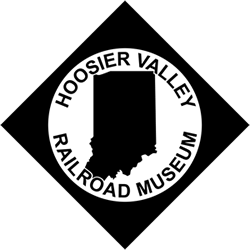The museum and gift shop will be closed starting December 21, 2025. Please watch our website for 2026 events.
Railroad History of North Judson
At one time, a significant portion of the working population in North Judson was employed by one of the railroad companies in town. The town once hosted four major rail lines including the Chesapeake & Ohio, Erie, New York Central and Pennsylvania. All lines crossed one another in close proximity and were controlled by the Pennsy's tower. There were quite a few stories from tower operators back in the day.
The small town of North Judson achieved significant importance when, at its peak, as many as 125 trains each day passed through this rural community. To truly appreciate just how much the railroads impacted North Judson, you should look through our collection of historic railroad maps. You can only imagine how difficult it must have been to get from one side of town to another with so many trains!
Gone are the days of high-speed freight and passenger service through this rural farm community. Almost everything was abandoned during the 1970s and '80s. The Hoosier Valley Railroad Museum is dedicated to preserving the railroad history of North Judson. HVRM seeks to keep the town's railroad heritage alive via display and operation of vintage railroad equipment atop the historic rails that bend their way around the museum.
Pennsylvania Railroad
The first railroad into town was a line constructed from Logansport to Valparaiso, Indiana in the years 1858 through 1861. This railroad was known as the Chicago and Cincinnati Railroad Company. In 1865 the Chicago & Cincinnati was merged with the Chicago & Great Eastern Railway Company. The town was originally called Brantwood, then changed to North Judson, after Judson, one of the promoters of the Chicago & Great Eastern Railway Company.
Years later, the line became part of the Pennsylvania Railroad and eventually Penn Central. The route was known as the Panhandle Line as saw regular freight service up until its abandonment by Conrail.
New York Central Railroad
The second railroad into town was the Indiana, Illinois and Iowa Railroad, also known as the 3I route. It was built from Streator, Illinois to North Judson in 1881, and onto South Bend, Indiana in 1894, The 3I would later become part of the New York Central Railroad. The line became known as the Kankakee Belt Route and became an important by-pass around the congested railroad situation in Chicago.
The New York Central merged with the Pennsylvania Railroad in 1968, forming Penn Central. PC operated the route until its eventual bankruptcy and merger into Conrail in 1976. The railroad ceased operations and the NYC tracks through town were removed in 1983.
Erie Railroad
The third railroad into town was the Chicago and Atlantic Railroad in the years 1881 through 1883. This railroad later became known as the Erie Railroad Company. Eventually, the Erie became the Erie Lackawanna and after the EL was merged into Conrail in 1976, service quickly ceased over this route.
In 1977, the Erie Western Railway took over operations of the railroad to preserve rail service to several customers along the line. They operated it until their demise in June 1979. After the failure of the Erie Western, the Chicago & Indiana Railroad operated the line for about six months until its own demise in December 1979.
The Tippecanoe Railroad took over operations in 1979 along a 16-mile stretch of trackage between North Judson and Monterey to serve a grain elevator in Monterey. Eventually, this section became known as the JK Line. The route eventually came under the control of the Toledo, Peoria & Western Railway who filed to abandon the route after the grain elevator in Monterey ceased rail shipments.
The line was railbanked and tracks removed in 2004, leaving a one mile segment of track which was donated to the Hoosier Valley Railroad Museum. HVRM now operates as this section as its "Erie Division" along with museum trackage that was rebuilt along the old Erie right-of-way. Sections of the remaining railbanked portion of the old route now hosts the Erie Trail.
Chesapeake & Ohio Railroad
In 1902 the Cincinnati, Richmond and Muncie Railroad became the fourth railroad into town. This railroad would later become part of the Chesapeake and Ohio Railway Company (C&O). The Chesapeake & Ohio Railroad's Cincinnati to Chicago mainline saw its first through passenger train in 1907 and later became known as the C&O of Indiana. The C&O offered limited passenger service on the line until 1948. The route would not see another passenger train again until 1974 when Amtrak's tri-weekly Cardinal from Chicago to Washington, DC started using the line.
The route eventually became part of the Chessie System in 1972 after merging with the Baltimore & Ohio and then CSX after merging with the Seaboard System in 1987. In 2004, CSX filed to abandon the remaining portion of the C&O through North Judson. The C&O segment between North Judson and Malden was saved through the efforts of the Hoosier Valley Railroad Museum and is now operated by the Chesapeake & Indiana Railroad.
North American Car Company
North American Car Company once had a railcar repair facility in North Judson. The facility was located in the current North Judson Industrial Park along the New York Central right-of-way. The repair shop was originally formed as the North Judson Car & Equipment Company in 1924. In 1927, the shop was purchased by North American to repair tank cars, reefers, and poultry cars. The building that once housed the North American Car was destroyed by a fire.
Hoosier Valley Railroad Museum
P.O. Box 75
North Judson, Indiana 46366
Call or Email
574-896-3950 Depot Phone
[email protected]
Museum Hours
The museum and gift shop are currently closed.
The museum operates on Central Time (Chicago Time)

